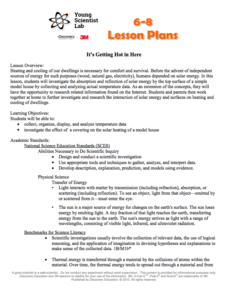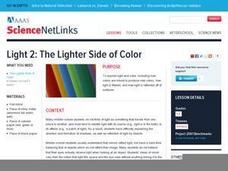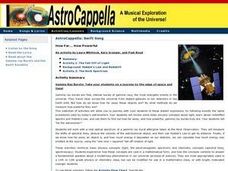Discovery Education
It's Getting Hot in Here
Class members engage in a STEM experiment and investigate how materials affect heating in a house by creating models of houses and using different top surface materials. They record the temperature inside the models and consider what the...
Curated OER
Unraveling the Mysteries of Objects in Space
Learners study emitted and absorbed light, and label each type of spectrum. They identify elements by their spectral signatures and use a spectroscope.
Curated OER
Internet Quest: Weatherman Walt-Why the Sky is Blue
Learners analyze atmosphere and light. In this earth science lesson, students are introduced to an investigation about why the sky is blue. Learners complete a WebQuest to answer the question.
Curated OER
Lesson 4 Activity 1: Mapping the Third Dimension
Students work in pairs to construct a simple stereoscope.
American Association for the Advancement of Science
Sensing the Invisible: The Herschel Experiment
Learners of light will construct a contraption in which light is passed through a prism and shone into a box. The temperatures at different points along the path and outside of the path of light. The intent is to imitate William...
Discovery Education
Sonar & Echolocation
A well-designed, comprehensive, and attractive slide show supports direct instruction on how sonar and echolocation work. Contained within the slides are links to interactive websites and instructions for using apps on a mobile device to...
NASA
Things Are Not Always What They Seem
Science is magic that works. Magical color-changing beads and a coffee can that follows voice commands are just two examples of magic tricks that rely on science. After completing a hands-on activity and an experiment investigating the...
It's About Time
Atoms with More Than One Electron
Provide young chemists with the ability to manipulate atoms and predict their results, in this sixth lesson. Pupils analyze energy patterns as they predict the amount of energy required to remove electrons from atoms. They compare trends...
Curated OER
Overhead Spectroscopy
Learners explore the relevance and importance of data collection and analysis techniques that use different parts of the electromagnetic spectrum. They observe the basic concepts of the visible electromagnetic spectrum and the...
Curated OER
The Lighter Side of Color
Students explore light and color, including how colors are mixed to produce new colors, how light is filtered, and how light is reflected off of surfaces. They read materials provided, complete worksheets, and complete hands-on activities.
Curated OER
How Far...How Powerful
Young scholars explore the concept of gamma ray bursts. They examine basic physics concepts about light, measure the shifts of spectral lines, and utilize Hubble's Law to deduce the velocity of an astronomical object.
Curated OER
As the Sun Burns
Students test commercial sunscreens or sunglasses for accuracy of their Sun Protection Factor. They devise a method for testing UV beads with a visual clues which they publish as research. They investigate occupations such as...
Curated OER
Exploring Solar Beads
Learners discover solar energy beads and learn about ultraviolet light. In this solar energy lesson, students learn about solar energy beads, ultraviolet light, and UV radiation dangers. Learners experiment with the beads to identify.
Curated OER
Supernova Chemistry
Using spectroscopes, high school astronomy, physics, or chemistry learners observe emission spectra from several different sources. This stellar NASA-produced lesson plan provides terrific teacher's notes and a student handout. Make sure...
Curated OER
Get the Picture!
Astronomers practice downloading data from a high-energy satellite and translate the data into colored or shaded pixels. As a hands-on activity, they use pennies to simulate high-energy satellite data and they convert their penny...
Curated OER
Can You See the Music?
Fourth graders examine the makeup of the electromagnetic spectrum and how the various forms of EMRs are similar and different from each other. They, in pairs, solve problems from worksheets imbedded in this lesson plan.
Curated OER
Stellar Spectral Fingerprints
Students listen as the teacher introduces Newton's early discovery of the diffraction of light. They use multiple sources of light (fluorescent, incandescent, sunlight, etc) to bend the light. They first use a prism then a diffraction...
Curated OER
Light My Fire ...Fly
Students examine fire flies. They measure the frequency of light stimulus used by communicating fire flies. Students explore the concept of organisms using light to communicate. Students film the fire flies and quantify the duration...
Curated OER
Spectral Surprise
Students create spectral colors. In this hands-on science lesson, students examine the electromagnetic spectrum as they follow steps to create a model that separates and displays light.
Curated OER
Identifying Elements
Students use diffraction glasses to find similarities and differences between observed spectrum of fluorescent light and an incandescent light They work in groups of 4-6 for the experiment/activity part of this exercise.
Curated OER
How Far... How Powerfu
Students work with a real optical spectrum of a gamma ray burst afterglow taken at the Keck Observatory. They measure the shifts of spectral lines, deduce the velocity of the astronomical object, and then use Hubble's Law to get its...
Curated OER
Electromagnetic Spectrum
Learners define electromagnetic radiation, list major categories and uses of electromagnetic waves, identify potential health risks with electromagnetic waves, and demonstrate understanding of Plank's constant by solving quantitative...
Curated OER
Earth's Winds, Crust, and Atmosphere
This site provides a variety of activities and worksheets about the problem-based learning activity about Earth and its atmosphere. The lessons can be used separately or together in a geology unit. The resources and charts are very...
Curated OER
Demonstrating That Light is Dissipated as Chlorophyll a Fluoresces
Students examine the concepts of light and chlorophyll. They participate in an experiment in which the chlorophyll shows as a red ring on the test tube. They answer discussion questions to end the lesson.

























